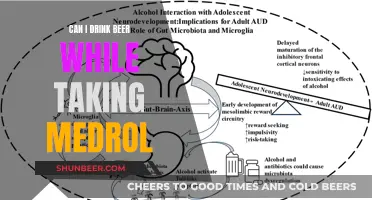
Excessive alcohol consumption is linked to a number of adverse health outcomes, including heart conditions. While moderate drinking—defined as one drink per day for women and one to two for men—may offer some protection against heart disease, heavy drinking can lead to serious cardiovascular issues. Binge drinking, in particular, can cause an irregular heartbeat, a condition known as Holiday Heart Syndrome, which increases the risk of a heart attack or sudden death. Additionally, long-term heavy drinking can result in heart disease, high blood pressure, and heart failure, all of which are significant risk factors for experiencing a heart attack. While the exact mechanism is unclear, studies suggest that alcohol consumption may contribute to heart issues by raising triglyceride levels in the blood, leading to fatty buildups in the artery walls. Therefore, while moderate drinking may have some heart health benefits, excessive alcohol consumption, including binge drinking, can increase the risk of heart attacks and other cardiovascular problems.
| Characteristics | Values |
|---|---|
| Can drinking beer cause a heart attack? | Excessive drinking cannot directly cause a heart attack but can increase a person's risk of having one. |
| What is excessive drinking? | Consuming four or more drinks in a single session for women or five or more drinks for men. |
| How does excessive drinking increase the risk of a heart attack? | Excessive drinking can lead to high blood pressure, which is a risk factor for heart attacks. |
| Are there other health risks associated with excessive drinking? | Yes, excessive drinking can also increase the risk of heart failure, arrhythmias, stroke, liver disease, cancer, peptic ulcers, and more. |
| Can moderate drinking be beneficial for heart health? | There is some evidence that moderate drinking (one drink per day for women and one or two for men) may have a protective effect against heart disease, but the consensus among medical professionals is that the drawbacks of alcohol outweigh any potential benefits. |
What You'll Learn
- Heavy drinking can cause high blood pressure, increasing the risk of a heart attack
- Alcoholic cardiomyopathy, a type of heart disease, can develop from drinking excessive amounts of alcohol
- Binge drinking can cause an irregular heartbeat, increasing the risk of a heart attack
- Excessive drinking can lead to weight gain, which is a risk factor for a heart attack
- Alcohol can increase the risk of blood clots, which can cause a heart attack

Heavy drinking can cause high blood pressure, increasing the risk of a heart attack
Heavy drinking can have severe adverse effects on one's health and well-being. It is defined as consuming eight or more drinks per week for women and 15 or more drinks per week for men. Binge drinking, on the other hand, is defined as consuming four or more drinks on one occasion for women, and five or more drinks for men.
Heavy drinking can cause high blood pressure, which is a significant risk factor for experiencing a heart attack or stroke. High blood pressure, also known as hypertension, can be caused by weight gain resulting from the excess calories in alcohol. Obesity and high blood pressure are two of the most important risk factors for heart attacks. Moreover, heavy drinking may also lead to heart tissue damage even before symptoms arise.
Alcoholic cardiomyopathy is a heart condition that can develop due to heavy drinking. It enlarges and distorts the heart, weakening the muscle and reducing its ability to pump blood efficiently. This can eventually lead to heart failure, which is when the heart can no longer pump blood around the body effectively.
In addition to the direct impact on the heart, heavy drinking can also cause an irregular heartbeat, known as arrhythmia, and increase the risk of a stroke. Arrhythmias are characterised by a heartbeat that is too fast, too slow, or irregular. A stroke occurs when blood flow to the brain is interrupted, leading to the death of brain cells.
To summarise, heavy drinking can cause high blood pressure, which increases the risk of a heart attack. However, this is not the only way that excessive alcohol consumption can impact cardiovascular health. The damage caused by heavy drinking can lead to a range of serious heart-related complications, including heart tissue damage, cardiomyopathy, arrhythmias, and stroke. Therefore, it is essential to drink in moderation or abstain from alcohol altogether to maintain cardiovascular health.
Beer Drinking: Weight Gain or Just a Belly?
You may want to see also

Alcoholic cardiomyopathy, a type of heart disease, can develop from drinking excessive amounts of alcohol
Alcoholic cardiomyopathy is a type of heart disease that can develop from drinking excessive amounts of alcohol. It is a condition where the heart changes shape due to long-term heavy alcohol use, causing long-term damage that can lead to heart failure and other severe problems. The condition weakens the heart muscle, preventing it from pumping blood efficiently.
The changes in the heart's shape caused by alcoholic cardiomyopathy lead to a reduction in its ability to pump blood effectively, which in turn reduces the body's available oxygen supply. This can result in a buildup of fat and other substances within the muscle cells, leading to enlargement of the heart and further increasing the risk of heart failure. Additionally, alcoholic cardiomyopathy can cause the formation of scar tissue, which can lead to potentially life-threatening arrhythmias or irregular heart rhythms.
The risk of developing alcoholic cardiomyopathy increases with heavy drinking. Heavy drinking is defined as consuming more than the recommended amount of alcohol, which is typically seven drinks per week for women and 14 drinks per week for men. Binge drinking, or consuming four or more drinks for women and five or more drinks for men on a single occasion, can also increase the risk of developing this condition.
The treatment for alcoholic cardiomyopathy involves reducing or completely abstaining from alcohol. In some cases, medication or even surgery may be required. Lifestyle changes, such as improving diet, getting regular exercise, and losing weight, can also help manage the condition.
It is important to note that not everyone who drinks alcohol excessively will develop alcoholic cardiomyopathy. However, heavy drinking can increase the risk of heart attack, high blood pressure, arrhythmias, stroke, and other cardiovascular issues. Therefore, it is crucial to drink in moderation and be aware of the potential risks associated with excessive alcohol consumption.
Pregnant and Curious About Non-Alcoholic Beer?
You may want to see also

Binge drinking can cause an irregular heartbeat, increasing the risk of a heart attack
Binge drinking is a dangerous activity that can have severe consequences for one's health, especially the heart. Defined as consuming four or more drinks in one sitting for women, or five or more drinks for men, binge drinking can cause an irregular heartbeat, also known as arrhythmia. This condition, sometimes called "Holiday Heart Syndrome", can leave you feeling breathless and tired, affecting your blood pressure and overall well-being. More importantly, it significantly increases the risk of a heart attack or sudden death.
The heart is a vital organ, responsible for pumping blood throughout the body. When the heart beats irregularly, it can lead to a range of problems. Arrhythmia, or an irregular heartbeat, can be caused by excessive alcohol consumption, particularly during binge drinking episodes. This disrupts the normal rhythm of the heart, causing it to beat too fast, too slowly, or in an unpredictable pattern.
The impact of binge drinking on the heart is not limited to arrhythmia. It can also lead to high blood pressure, also known as hypertension. This condition is a significant risk factor for heart attacks and strokes. Additionally, heavy drinking can contribute to weight gain due to the high calorie content of alcohol, further increasing the risk of high blood pressure and related cardiovascular issues.
The negative effects of binge drinking on heart health are not limited to the short term. Long-term, heavy drinking can lead to heart disease and other cardiovascular issues. This includes alcoholic cardiomyopathy, a type of heart disease that enlarges and distorts the heart, weakening the muscle and impairing its ability to pump blood efficiently. This condition can ultimately lead to heart failure and death.
In conclusion, binge drinking can cause an irregular heartbeat, increasing the risk of a heart attack. However, it is important to note that even moderate drinking may have negative effects on heart health. Therefore, it is crucial to follow low-risk drinking guidelines, such as those provided by the UK Chief Medical Officers, to reduce the risk of developing heart-related problems.
Beer and High Blood Pressure: Safe to Drink?
You may want to see also

Excessive drinking can lead to weight gain, which is a risk factor for a heart attack
Excessive alcohol consumption can lead to weight gain, which is a contributing factor to heart attacks. Alcohol is a source of excess calories, and drinking excessively can cause long-term weight gain. Obesity is a risk factor for heart attacks, and heavy drinking can lead to obesity and the long list of health issues that come with it.
The Centers for Disease Control and Prevention (CDC) define heavy drinking as consuming eight or more drinks per week for women or 15 or more drinks per week for men. Excessive drinking is defined as consuming four or more drinks in a single session for women or five or more drinks in one sitting for men. Binge drinking, which can cause an irregular heartbeat called arrhythmia, is defined as consuming four or more drinks on one occasion for women, or five or more drinks for men.
Excessive drinking can also lead to high blood pressure, which is one of the most important risk factors for experiencing a heart attack or stroke. High blood pressure can be caused by weight gain from the calories in alcohol. Heavy drinking may also weaken the heart muscle, affecting its ability to pump blood efficiently. This is known as cardiomyopathy and can cause death, usually through heart failure.
Alcoholic cardiomyopathy is a type of heart disease that develops due to drinking excessive amounts of alcohol. Cardiomyopathy enlarges and distorts the heart, weakening the muscle and preventing it from pumping blood efficiently. This can lead to a heart attack, which occurs when the blood supply to the heart's muscles is cut off, starving the heart of oxygen.
While moderate drinking may have some health benefits, excessive alcohol consumption can lead to serious health issues, including weight gain, which increases the risk of heart attack.
Parked, Drinking Beer: Legal or Not?
You may want to see also

Alcohol can increase the risk of blood clots, which can cause a heart attack
Excessive alcohol consumption can have detrimental effects on the heart and significantly increase the risk of a heart attack. While moderate drinking may offer some protective effects, heavy drinking can lead to serious cardiovascular complications, including heart disease, high blood pressure, and heart failure.
Alcohol's impact on the heart is primarily through its contribution to cardiovascular disease (CVD). CVD is a condition that develops due to long-term heavy drinking and is characterised by the damage it causes to the heart, arteries, and blood vessels. One of the key mechanisms by which alcohol contributes to CVD is by increasing the risk of blood clots.
Blood clots can form in the narrowed arteries of the heart, blocking the supply of blood and oxygen to the heart muscle, resulting in a heart attack. Alcohol consumption, particularly in excessive amounts, can lead to a sustained increase in blood pressure, a condition known as hypertension. Hypertension is a crucial risk factor for heart attacks and strokes.
Additionally, alcohol can weaken the heart muscle, a condition known as cardiomyopathy. This weakening of the heart muscle impairs its ability to pump blood efficiently, which can lead to heart failure. Heart failure occurs when the heart can no longer pump blood effectively to meet the body's needs, resulting in symptoms such as swelling of the ankles and shortness of breath.
Moreover, alcohol can also increase the levels of triglycerides in the blood. High triglyceride levels, coupled with either excess low-density lipoprotein (LDL) cholesterol or insufficient high-density lipoprotein (HDL) cholesterol, contribute to fatty buildups in the artery walls. These fatty deposits further narrow the arteries, making it harder for blood to flow and increasing the likelihood of blood clots.
While moderate drinking may have some potential benefits for the heart, such as raising HDL cholesterol levels and preventing blood clots, the consensus among medical professionals is that the risks associated with alcohol consumption far outweigh any potential benefits. Therefore, it is essential to drink in moderation or abstain from alcohol altogether to maintain heart health and reduce the risk of cardiovascular complications, including heart attacks.
Get Rid of Your Beer Gut: Tips for a Trimmer You
You may want to see also







